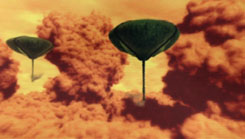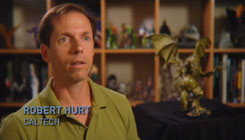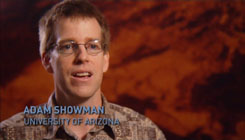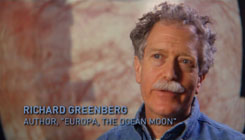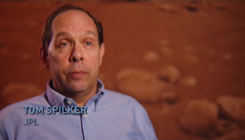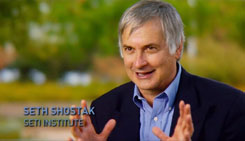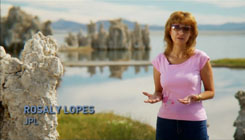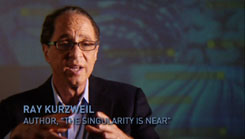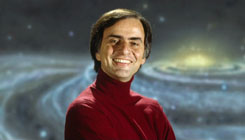Here's an episode tackling some interesting ideas and material,
with mixed fortunes. Most of it is really good and fascinating,
but it does go off course and get stuck before the end....
The first segment tackles the question of what it would take
for life as we understand it to arise on our planet or any other.
Much emphasis is placed on the chemical building blocks of life,
and what the Miller-Urey experiment proved about the ease in
creating those blocks throughout the universe. Unique bits
include brief descriptions and photos of who Miller and Urey were,
while this documentary pays much homage to Dr. Carl Sagan and his
Cosmos series, particularly its
second episode. In fact, it often seems to be using some
of the same footage from Cosmos #2 for the experiment, and of course
extrapolating the concept of the Jupiter creatures presented at that episode's end.
However, Robert Hurt pursues the idea of one of those creatures to
a much greater extent, and with some gorgeous new CGI footage of
his "floaters". These details are really cool, and the concept
is worth checking out.
Segment two is devoted to the possibility of life on Jupiter's moon Europa.
We get details on the huge volume of water making up the ocean that
scientists believe lies beneath its icy crust, and we learn the length
of a Europan day. Dr. Richard Greenberg shares his educated speculation
on the various components of a possible ecosystem, deriving energy from
both photosynthesis and thermal venting, while also suspecting that
Human space probes may not need to drill through the icy crust to find
solid evidence of life.
Segment three shifts to Saturn's giant moon Titan. Scientists speculate
on both very exotic hydro-carbon based life on its extremely cold surface,
and on more familiar water-based life living hundreds of kilometers deep
under its surface. The episode presents many of the challenges our space probes
are faced with in getting good photos and information from this moon,
including the limits of Cassini-Huygens.
The fourth segment allows Seth Shostak to make his case for SETI's
efforts to discover alien life via radio. Interestingly, we actually see
the set-up of one array of automated radio-telescopes that Shostak's team
is using. Although I don't have much faith that radio will be the medium
through which scientists finally get their big "Aha!" confirmation, it seems
the SETI program could get a big boost in its effectiveness by narrowing its
search with all the newly available data on exoplanets around other stars.
We have a much better understanding now where the Earth-type planets may be.
The episode takes a left turn and goes way off-topic for its final segment,
as Ray Kurzweil makes a thin case for our own technological advances in
computing to make us all want to become cyborgs. Who's he kidding?
Does anyone in the audience WANT to do that stuff to themselves?
There's a LOT he's not taking
into account surrounding biology and metaphysical beliefs that will make
most people leave his ideas collecting dust on a shelf, not bought, not funded.
As Luke Skywalker's uncle said to the Jawa salesman,
"Hey, whatcha trying to push on us?"
Would Humanity's first contact be with a cyborg or completely robotic species instead
of a purely biological one? I think that idea presumes that the aliens haven't been
here before, don't know what to expect, and so their probes and machinery arrive
first to better handle an environment hostile to their natural selves.
I see no reason to hold my breath for that,
and it's certainly not an effective way to quickly dismiss evidence of U.F.O. reports
or Zeta-Reticuli-types of species that have surfaced in recent decades.
What if a proper two-way contact big enough to make it through the major
news media had the aliens acknowledging on some level that either they or
their ancestors had been here long ago influencing both our ancient history and our creation,
and have been here many times again more recently?
The real question may be for us to feel psychologically ready
to acknowledge the evidence already at our feet and our fingertips.
A retroactive "first contact" seems the most likely to me.
Aliens who have been here before
are more likely to show up first, and/or pass notes along
to any other species who might want to approach us for the first time....
However, that's not to diminish the joy we could have the first time we,
by proxy through our probes, go somewhere else in the universe and say,
"Hey, there are indigenous microbes and algae here! We've found life!"
This episode has put most of its screentime and effort into that
scientifically safe idea, and is a very interesting success because of it.
|
Participants include:
Chapter Breakdown:
- Introduction
- Life's Basic Chemistry
- Europa
- Titan
- Radio Waves
- Intelligent Machines
|
|

